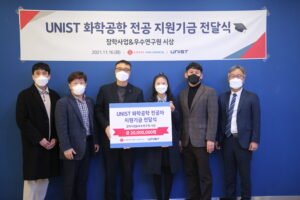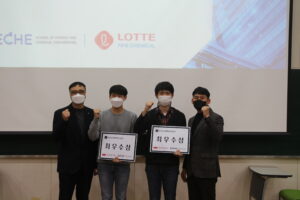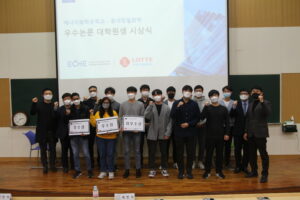[Evnet] School of Energy and Chemical Engineering holds 2021 Outstanding Paper Graduate Student Awards (21.11.16)
2022.07.12On November 16, UNIST’s School of Energy and Chemical Engineering held an award ceremony with Lotte Fine Chemical for outstanding graduate students who will lead future science and technology researchers who contribute to humanity.
The UNIST Graduate School of Energy and Chemical Engineering Award was selected for six best awards and 23 excellence awards this year as awards that can be received if papers are listed in the world’s top authorized magazines such as Nature every year.
In particular, this year, Lotte Fine Chemical’s eco-friendly research support policy provided a small prize to the winners, raising the honor.
Date and time: November 16, 2021 (Tue) 14:30~
Location: 104-dong E206
Title: Unist Department of Energy and Chemical Engineering and Engineering Administration
<a donation event>

<2021 Graduate Student Awards for Excellence in School of Energy and Chemical Engineering _ the grand prize>

JONGDEUK SEO(Nature registered, academic advisor Jin Young Kim), who was selected for the best award category, studied how to improve the performance of solar cells by replacing some of the anions of perovskite, which are used as light absorbers for solar cells, with formates. Formates are involved in the process of forming perovskite crystals to create high-quality perovskite. In addition, it binds to the anion site on the surface of the perovskite crystal instead of the halogen ion and interacts with the surrounding elements to increase durability. The anion that usually enters perovskite is a halogen ion such as iodine (I-) or bromine (Br-), which is also of great academic significance in that it broke stereotypes and introduced formate, a polyatomic ion.
Another award-winning Deokjae Choi (Advanced Energy Materials, ACS Nano Registration: academic advisor Kwanyong Seo) has developed a new technology that can overcome the limitations of existing crystalline silicon solar cells (high temperature processes above 900 degrees, use of toxic substances, recombination by impurities). One of the biggest challenges of the solar cell industry is to continuously lower costs while maximizing the efficiency of devices. To this end, a nanometer-thick oxide film is formed on a crystalline silicon wafer at 200°C or less through an atomic layer deposition method without using an existing impurity injection process, thereby manufacturing a high-efficiency solar cell of 20% or more. This technology is expected not only to be able to develop high-efficiency crystalline silicon solar cells, but also to simplify processes and reduce solar cell unit costs.
< A group photo>

“School of Energy and Chemical Engineering is leading carbon neutrality with the world’s No. 1 competitiveness in clean energy, especially in next-generation battery and hydrogen energy,” said Hyun-Kon Song, head of UNIST’s School of Energy and Chemical Engineering.
Against this backdrop, our graduate students have listed papers in top international journals such as Nature, and we will continue to be the world’s best based on our excellent human infrastructure. We will do our best to lead in low-carbon economy and society, such as responding to recent climate change, security, and eco-friendliness.
Meanwhile, the UNIST Award Ceremony for Outstanding Graduate Students of Energy and Chemical Engineering was held at UNIST on the afternoon of November 16 with more than 30 winners, including UNIST and Lotte Precision Chemical officials.

